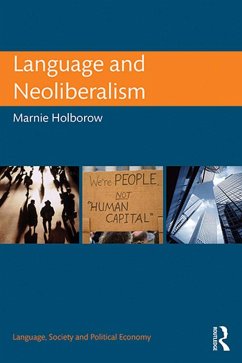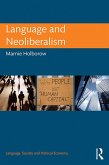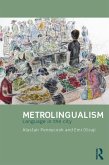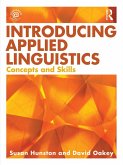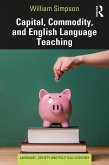Language and Neoliberalism examines the ways in which neoliberalism, or economic liberalism, finds expression in language. In this groundbreaking original study, Holborow shows at once the misleading character of ideological meaning and the underlying social reality from which that meaning emerges.
In universities, it is now the norm to use terms like entrepreneurial and business partnerships. How have these terms become a core component of education and gained such force? Markets have become, metaphorically, a power in their own right. They now tell governments how to act and warn them against too much public spending. Post-crash, the capitalist market continues to be crisis-prone and in that context the neoliberal ideology remains contested.
Free of jargon and assuming no specialist knowledge, this book will strike a chord internationally by showing how neoliberal ideology has, literally, gone global in language. Drawing on VoloSinov and Bakhtin, Williams and Gramsci, and introducing concepts from Marxist political economy, Language and Neoliberalism is essential reading for all interested in the intersection of linguistics/ applied linguistics and politics.
In universities, it is now the norm to use terms like entrepreneurial and business partnerships. How have these terms become a core component of education and gained such force? Markets have become, metaphorically, a power in their own right. They now tell governments how to act and warn them against too much public spending. Post-crash, the capitalist market continues to be crisis-prone and in that context the neoliberal ideology remains contested.
Free of jargon and assuming no specialist knowledge, this book will strike a chord internationally by showing how neoliberal ideology has, literally, gone global in language. Drawing on VoloSinov and Bakhtin, Williams and Gramsci, and introducing concepts from Marxist political economy, Language and Neoliberalism is essential reading for all interested in the intersection of linguistics/ applied linguistics and politics.
Dieser Download kann aus rechtlichen Gründen nur mit Rechnungsadresse in A, B, BG, CY, CZ, D, DK, EW, E, FIN, F, GR, HR, H, IRL, I, LT, L, LR, M, NL, PL, P, R, S, SLO, SK ausgeliefert werden.
'An acute, imaginative piece of discourse analysis which reveals in tenacious detail just how deeply our language has been contaminated by the dehumanising idiom of the corporations' Terry Eagleton, University of Lancaster, UK
'Holborow raises the bar for studies of language and political economy. She applies subtle Marxist analyses to how keywords linked to markets and entrepreneurialism are shaping an ever-increasing number of spheres and activities. She provocatively asks when, how and if metaphors of market and commodity-including uses by critical scholars-challenge neoliberal ideologies. This book is a crucial read for applied linguists, sociolinguists, linguistic anthropologists, and anyone interested in the role of language in ideologies that justify or obscure or try to make commonsensical exploitative economic relations.' Bonnie McElhinny, University of Toronto, Canada
'...the book is a notable contribution to the study of neoliberalism as a political as well as an economic project, and its emphatic distinction 'between the ideological representation of the world and ... the real experience of class conflict' (130) constitutes, amongst other forms of praxis, a crucial dimension of 'the much needed challenge to neoliberalism' (131) - a challenge that many of our more 'fashionable' theories are unable to present.' Liane Tanguay (University of Houston-Victoria) Key Words
'Holborow raises the bar for studies of language and political economy. She applies subtle Marxist analyses to how keywords linked to markets and entrepreneurialism are shaping an ever-increasing number of spheres and activities. She provocatively asks when, how and if metaphors of market and commodity-including uses by critical scholars-challenge neoliberal ideologies. This book is a crucial read for applied linguists, sociolinguists, linguistic anthropologists, and anyone interested in the role of language in ideologies that justify or obscure or try to make commonsensical exploitative economic relations.' Bonnie McElhinny, University of Toronto, Canada
'...the book is a notable contribution to the study of neoliberalism as a political as well as an economic project, and its emphatic distinction 'between the ideological representation of the world and ... the real experience of class conflict' (130) constitutes, amongst other forms of praxis, a crucial dimension of 'the much needed challenge to neoliberalism' (131) - a challenge that many of our more 'fashionable' theories are unable to present.' Liane Tanguay (University of Houston-Victoria) Key Words

